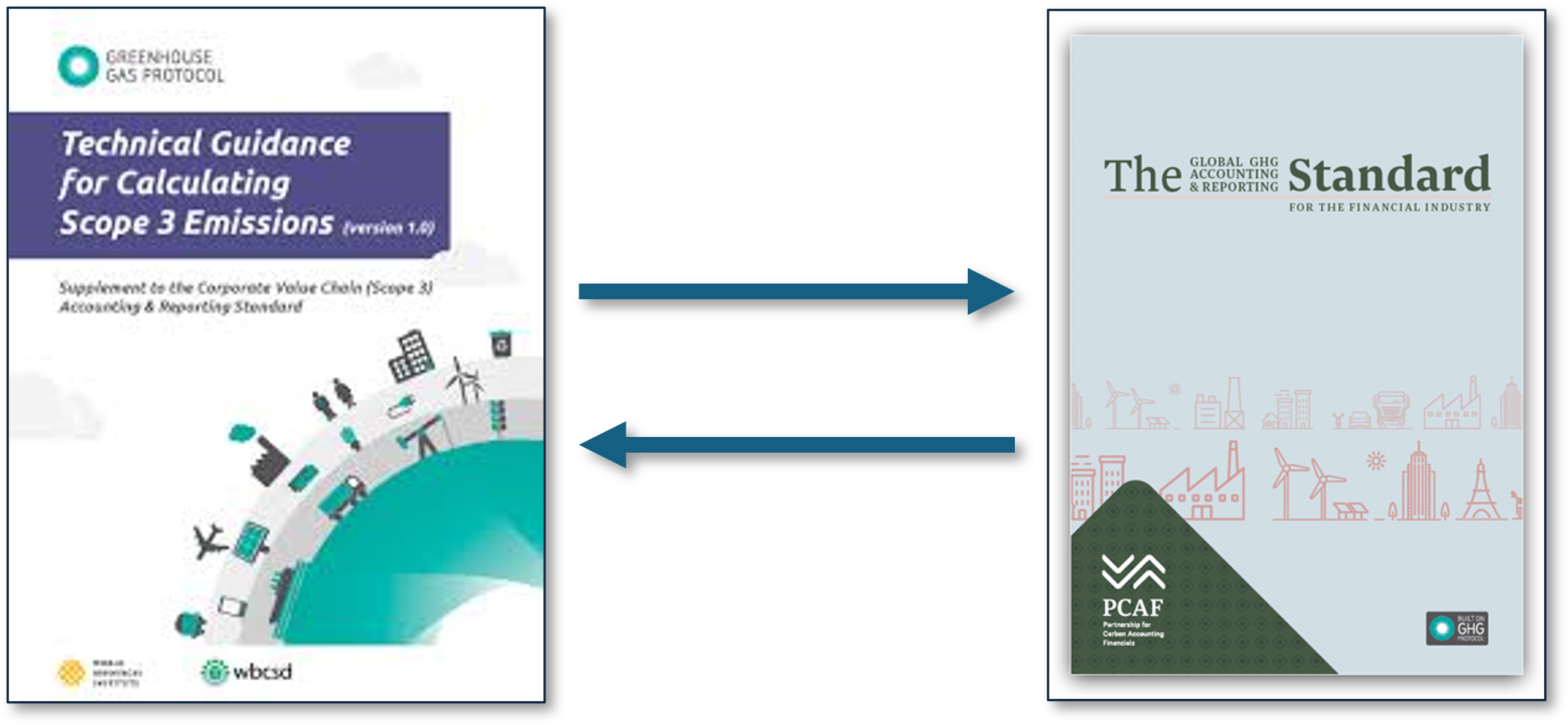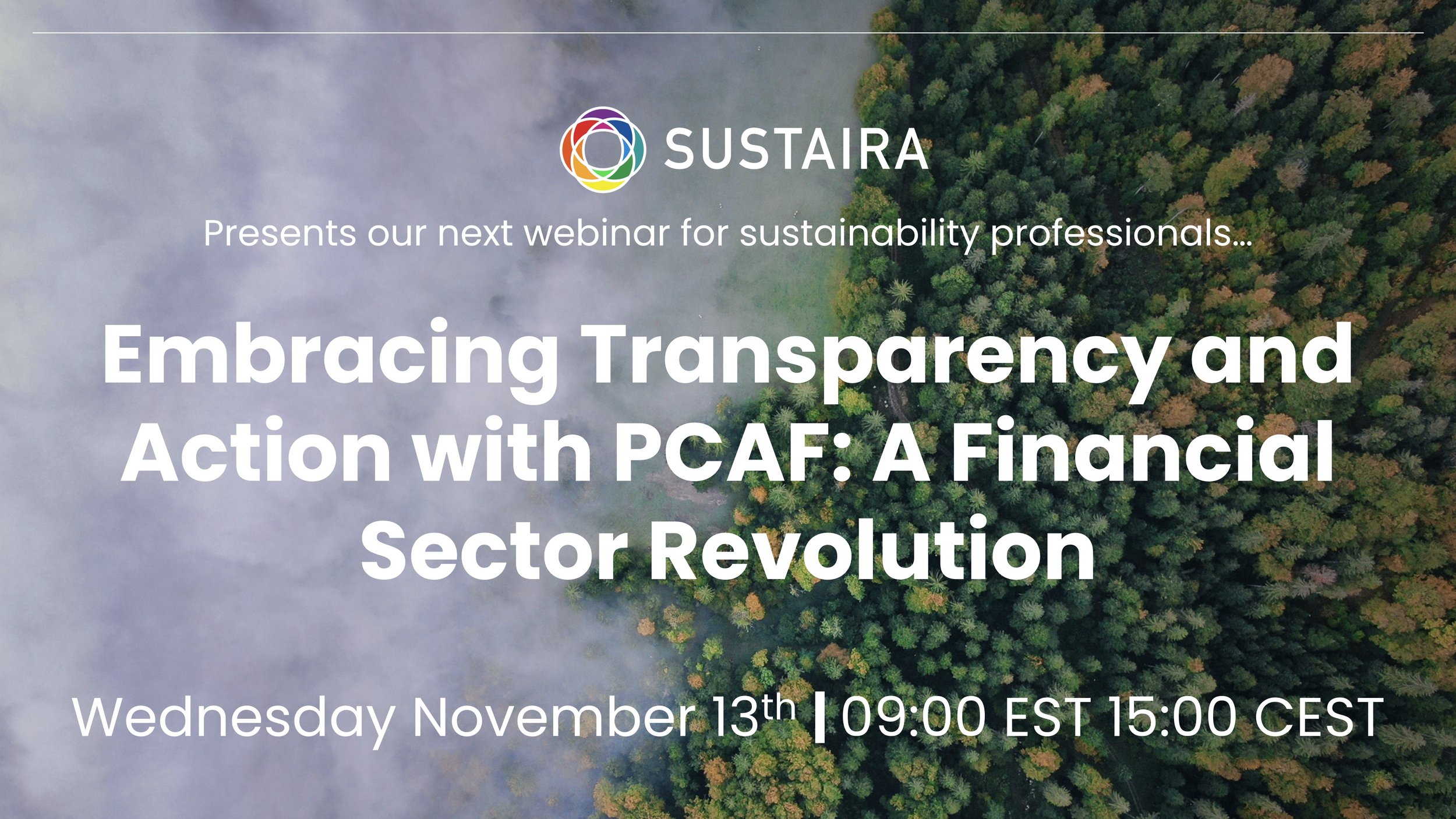Embracing Transparency and Action with PCAF: A Financial Sector Revolution
We are proud to share our deep-dive into PCAF, the who? what? why? where? and how? We are also excited to announce we will bring together many PCAF professionals in our upcoming webinar on November 13th! Registration is still open to sign up via the link at the bottom of this page.
In the rapidly evolving global finance landscape, transparency is not just a buzzword but a strategic imperative. The Partnership for Carbon Accounting Financials (PCAF) plays a vital role in setting the standard for financed emissions, empowering financial institutions to account for and disclose the climate impact of their portfolios. Since its establishment in 2015 by ASN Bank and 14 Dutch financial institutions, PCAF has expanded globally, introducing the Global GHG Accounting and Reporting Standard for the Financial Industry. This framework is essential in supporting financial institutions to meet the ambitious targets set by the Paris Agreement. With transparency at its core, PCAF offers a roadmap for financial institutions to actively contribute to the fight against climate change and reduce their financed emissions.
PCAF’s Strategic Vision and Global Impact
PCAF’s mission transcends merely setting standards—it seeks to realign the financial sector with the environmental demands of the planet, facilitating the transition to net-zero. Before PCAF, the financial industry lacked a unified, transparent method of measuring and reporting financed emissions, leaving institutions unsure of how to track their climate impact. By standardizing the process, PCAF provides financial institutions with a comprehensive tool to not only report emissions but actively manage and reduce their overall carbon footprint.
PCAF’s Integration with the Greenhouse Gas Protocol
PCAF’s framework is further reinforced by its alignment with the Greenhouse Gas Protocol (GHGP), earning the prestigious "Built on GHG Protocol" mark. This recognition reflects PCAF’s adherence to GHGP’s principles of completeness, consistency, relevance, accuracy, and transparency. Financial institutions using PCAF’s methodology must report emissions from all activities they can influence financially or operationally, ensuring comprehensive accounting of all emission sources. This alignment provides a holistic view of institutions’ climate impact, further strengthening the accuracy and integrity of their emissions reporting.
PCAF Asset Classes Explained
PCAF’s methodology categorizes financed emissions into six key asset classes, ensuring a consistent approach across institutions for effective emissions tracking:
Equities and Bonds: Includes common stocks and corporate bonds, the backbone of many investment portfolios.
Corporate Financing: Covers business loans and private equity, crucial for funding corporate growth and operations.
Infrastructure and Project Finance: Encompasses large-scale projects such as renewable energy plants and infrastructure development.
Real Estate Investments: Involves commercial property loans, a significant area for applying green building standards.
Residential Loans: Mortgages that can influence sustainable home building practices.
Transportation Financing: Loans for vehicle purchases, driving opportunities for electric vehicle adoption.
By addressing these asset classes, PCAF enables institutions to uniformly track and report emissions across diverse portfolios. This uniformity is critical for financial institutions to adopt a consistent methodology for all asset classes, fostering sector-wide accountability.
Addressing Key Challenges in Carbon Accounting
PCAF was designed to address several core challenges within the financial sector:
Standardization: Offering a consistent method for reporting financed emissions across institutions.
Regulatory Compliance: Assisting institutions in meeting growing regulatory and investor demands for transparency in climate impact disclosures.
Data Complexity: Simplifying the collection and verification of emissions data across diverse asset classes.
Alignment with Global Goals: Providing a framework that helps institutions align with international agreements like the Paris Agreement, ensuring effective contributions to global emissions reduction targets.
How Sustaira Amplifies PCAF’s Objectives
At Sustaira, we recognize that adopting frameworks like PCAF can feel overwhelming. Our platform is designed to simplify this process. Tools like our CARBON Accounting App and ESG Evaluation Framework turn complexity into clarity. Sustaira’s software doesn't just help with compliance—it enables institutions to leverage their data for meaningful environmental impact, embedding sustainability into the core of their operations.
Ensuring Data Quality with Sustaira
Data quality is critical in carbon accounting, as it directly impacts the accuracy of reported emissions. Sustaira enhances data quality by:
Automated Data Collection: Reducing human error with automated data feeds, ensuring accuracy and timeliness.
Robust Data Verification: Layering verification processes to guarantee data integrity and alignment with PCAF standards.
Continuous Data Improvement: Providing tools that help institutions refine their data collection processes, adhering to PCAF’s high standards for data quality.
Sustaira’s Tailored Solutions for PCAF Compliance
Our tailored solutions not only meet but exceed compliance standards, enabling financial institutions to set new benchmarks in sustainability reporting. Sustaira’s intuitive interfaces and comprehensive analytics empower users to track, analyze, and report emissions with ease. Here’s how Sustaira helps institutions turn challenges into opportunities:
Data Precision: Pinpoint emissions hotspots across your portfolio with detailed analytics.
Regulatory Alignment: Stay compliant with current regulations and adaptable to future changes.
Strategic Insights: Use data to inform decisions on investments, products, and strategies.
Join Us on the Journey to Sustainability
The complexity of measuring emissions in line with PCAF standards—particularly when dealing with data from various sources—can be daunting. Digital tools, like Sustaira’s platform, offer the flexibility and precision needed to manage this complexity. By adopting PCAF’s standards and leveraging Sustaira’s solutions, financial institutions can streamline their sustainability efforts, enhancing transparency and contributing to global climate goals.
Explore Sustaira’s platform and join a growing network of pioneers shaping the future of financial sustainability. Together, we can create a sustainable future.
Webinar | Embracing Transparency and Action with PCAF: A Financial Sector Revolution
Date & Time: November 13th, 09:00 EST
Join us for an insightful webinar on the Partnership for Carbon Accounting Financials (PCAF), where we will explore how this global standard empowers financial institutions to measure and disclose the climate impact of their portfolios. Learn about PCAF’s integration with the Greenhouse Gas Protocol and its comprehensive approach to tracking emissions across various asset classes. Discover how tools like Sustaira’s platform can simplify compliance and enhance data quality, driving meaningful environmental impact.



